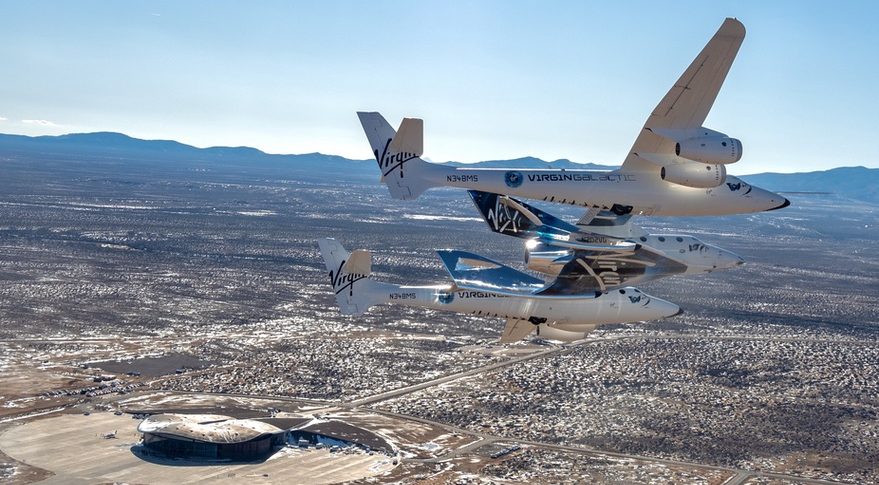
Virgin Galactic’s SpaceShipTwo arrives in New Mexico
by Jeff FoustWASHINGTON — Virgin Galactic’s SpaceShipTwo suborbital spaceplane arrived at the company’s spaceport in New Mexico Feb. 13, ready for a final series of test flights before the company starts commercial operations.
The vehicle, named VSS Unity, flew from the Mojave Air and Space Port in California to Spaceport America in southern New Mexico attached to its WhiteKnightTwo carrier aircraft. The company used the flight to perform environmental evaluations of the vehicle and also conduct pilot training and familiarization.
The long-awaited transfer of VSS Unity from California to New Mexico marks the beginning of the final stage of flight tests of the vehicle. Virgin said it plans to perform a series captive carry flights, where SpaceShipTwo remains attached to WhiteKnightTwo, and glide flights, where SpaceShipTwo is released and glides back to the spaceport. Those will be followed by an unspecified number of powered test flights.
“We still have significant work ahead, but we are grateful to all our teammates who have made this day a reality,” George Whitesides, chief executive of Virgin Galactic, said in a statement about the move of SpaceShipTwo to New Mexico.
VSS Unity made its last powered flight nearly a year ago. Since then Virgin Galactic has been making upgrades to the vehicle, including outfitting its cabin for commercial flights.
At the 23rd Commercial Space Transportation Conference here in January, company officials provided few schedule updates about the upcoming testing program, beyond saying that SpaceShipTwo would be transported to New Mexico “soon.”
Beth Moses, chief astronaut instructor at Virgin Galactic and part of the crew of the last powered flight of the vehicle, said at the conference one thing that will be tested on upcoming flights is how the cabin works with several people in it. “We need to increase our passenger density,” she said. “We’re hoping to refine the bespoke training. With four people in the cabin, how does it work out?”
In past investor presentations filed with the U.S. Securities and Exchange Commission, Virgin Galactic has projected beginning commercial service by June. The company has not provided a recent update to those plans, but may do so when the publicly traded company releases its fourth quarter and full year financial results Feb. 25.
Virgin Galactic started trading on the New York Stock Exchange in October after completing a merger with Social Capital Hedosophia, a special-purpose acquisition company that was already traded on that exchange. Virgin’s stock has, in recent weeks, soared to record highs, closing Feb. 13 at $23.66 a share, roughly double the price when it debuted on the exchange in October.
The arrival of SpaceShipTwo at Spaceport America was also a milestone for the state of New Mexico, which announced plans to develop the spaceport in 2005 and has waited patiently through the vehicle’s extended development program. While the runway and main terminal building were completed nearly a decade ago, Virgin Galactic completed the interior of the terminal building and declared it operationally ready only in August.
State officials see Virgin Galactic as an anchor for a growing space industry in the area, which they have dubbed “Space Valley.” Exos Aerospace and Up Aerospace have performed suborbital vertical launches from the spaceport, while SpinLaunch, a secretive company working on an alternative launch technology, is developing a test site there.
“Today marks another step closer: We will have a genuine Space Valley in Southern New Mexico, a hotbed of innovation and achievement and space tourism development,” New Mexico Gov. Michelle Lujan Grisham said in a statement.